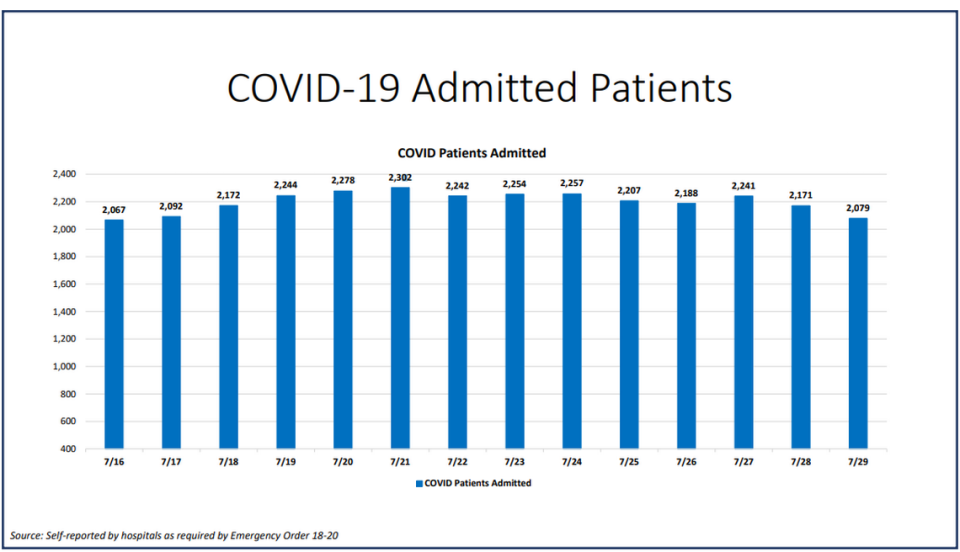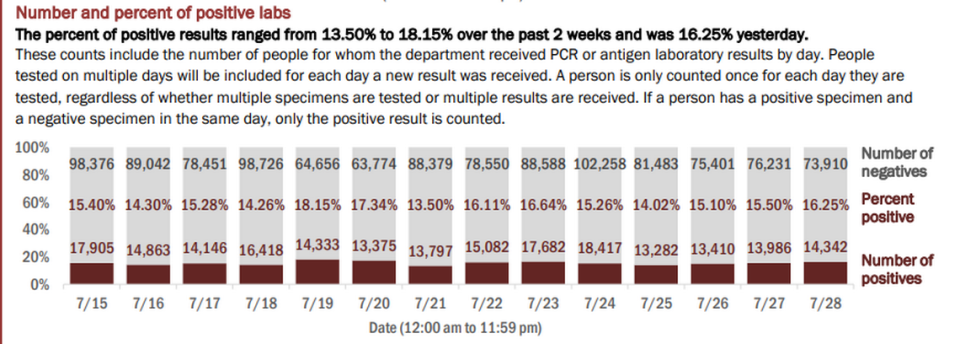Florida hit with 216 coronavirus deaths, breaking a record for the second day in a row
Florida’s Department of Health on Wednesday confirmed 9,446 additional cases of COVID-19, bringing the state’s known total to 451,423. There were also 216 Florida resident deaths announced, setting another fatality record in the state for the second day in a row.
The statewide resident death toll is now at 6,333.
The 216 deaths mark the highest single-day Florida resident death toll announced by the Florida Department of Health since the pandemic began, but it does not necessarily mean that every person died in the past 24 hours.
In Florida, the deaths announced on a given day could be from several days earlier because the state information does not include the exact date of death. Previously, the highest single-day Florida resident death toll was reported on Tuesday, with 186 deaths.
Florida’s COVID-19 Data and Surveillance Dashboard later updated Tuesday to show that one new non-resident death was announced, bringing the non-resident death toll to 124.
Listen to today's top stories from the Miami Herald:
Subscribe: Apple Podcasts | Spotify | Amazon Alexa | Google Assistant | More options
Confirmed COVID-19 cases in South Florida
▪ Miami-Dade County reported 2,791 additional confirmed cases of COVID-19 and 30 new deaths, according to Florida’s Department of Health. The county now has 113,143 confirmed cases and 1,455 deaths.
▪ Broward County reported 1,313 additional confirmed cases of the disease and 31 new deaths. The county now has 52,970 known cases and 638 deaths.
▪ Palm Beach County saw 573 additional confirmed cases and 16 new deaths. The county now has 32,171 confirmed cases and 795 deaths.
▪ Monroe County reported 23 additional cases of the disease and no new deaths. The Florida Keys now have 1,198 confirmed cases and six deaths.
Here’s a breakdown on what you need to know:
How many people have recovered from coronavirus in Florida? It’s complicated
COVID-19 hospitalizations in Florida
One of the tools that officials are relying on to determine whether the coronavirus situation is improving in the state is hospitalization data. Unlike testing, which might be limited or take days to report results, hospitalizations can help give officials a real-time snapshot of how many people are severely ill with COVID-19.
Earlier this month, the Florida Agency for Health Care Administration began reporting the number of patients hospitalized statewide with a “primary diagnosis of COVID.” The data, which is updated at least every hour, does not distinguish between the number of COVID-19 patients in hospital intensive care units and those in acute care beds, which require less attention from nurses.
Previously, the state was only providing the total number of hospitalizations in its statewide and county-level data. Miami-Dade was an exception, with hospitals self-reporting a number of key metrics, including hospitalizations, to the county, which has made this data public for several months.
As of 3:46 p.m. Wednesday, there were 8,717 COVID-19 patients admitted into hospitals throughout the state, according to the Florida Agency for Health Care Administration dashboard.
Of those, 1,946 were in Miami-Dade, 1,267 in Broward, 561 in Palm Beach and 16 in Monroe counties, according to the agency.
Florida’s current hospitalization data does not always match the hospitalization data reported in Miami-Dade’s “New Normal” dashboard. Jennifer Moon, deputy mayor of Miami-Dade, previously told the Miami Herald that there may be a number of reasons why the county’s hospitalization data differs from the state’s.
She said these reasons include the frequency of daily updates, human error and whether the state’s agency is including in its data the patients who visited the emergency room for other urgent medical needs and tested positive for COVID after they are admitted.
On Wednesday, Miami-Dade hospitalizations for COVID-19 complications decreased from 2,171 to 2,079 according to Miami-Dade County’s “New Normal” dashboard. According to Wednesday’s data, 358 people were discharged and 141 people were admitted.

The state has had a total of 25,499 Florida residents hospitalized for COVID-19 related complications, according to Florida’s COVID-19 Data and Surveillance Dashboard.
COVID-19 testing in Florida
Testing in Florida has seen steady growth since the COVID-19 crisis began.
Testing, like hospitalizations, helps officials determine the virus’ progress and plays a role in deciding whether it is safe to lift stay-at-home orders and loosen restrictions.
The recommended number of daily tests needed varies among experts, but the dean of the University of South Florida’s College of Medicine told the governor that Florida needs to test about 33,000 people every day.
On Wednesday, Florida’s Department of Health reported 88,252 new tests on Tuesday. The positive rate was 16.25% of the total, according to the report. In total, 4,557,000 tests have been conducted.

To date, 3,531,721 people have been tested in Florida. Of the total tested, 451,423 (about 12.78%) have tested positive. The state says there are 3,220 tests with pending results.
The state began adding antigen test results to Florida’s case totals earlier this month. Antigen tests are a new category of tests that detect fragments of proteins found in the virus by testing samples collected by nose swabs. The FDA authorized the first antigen COVID-19 tests in May.

